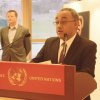| Interagency Panel on Juvenile Justice |
|
13 UN agencies & NGOs providing technical assistance in juvenile justice. The United Nations Interagency Panel on Juvenile Justice (IPJJ) was established following the United Nations Economic and Social Council (ECOSOC) Resolution 1997/30 which specifically requests the creation of a "coordination panel on technical advice and assistance in juvenile justice". The IPJJ began its work in 2000 and is currently composed of 13 United Nations agencies and non-governmental organisations actively involved in juvenile justice. Since 2008, the Panel's approach to juvenile justice includes the protection of the rights of children in conflict with the law and child victims and witnesses of crimes. This approach is in line with the United Nations Secretary General's Guidance Note on the UN Approach to Justice for Children issued in September 2008. In order to ensure that justice systems dealing with children in conflict with the law comply with the rights of the child, a maximum coordination is needed. It is in that spirit that the IPJJ was created. - Actions are needed to protect the rights of children in contact with justice systems worldwide -Children's rights are being violated on a daily basis in juvenile justice systems. It is estimated that over 1.1 million children are deprived of their liberty worldwide, often suffering severe violations of their basic rights. Arrest, detention and sentencing are often arbitrary and sometimes even illegal. Detained children can be below the age of criminal responsibility and held with adult prisoners who may abuse of them. Frequently, the conditions under which they must survive are deplorable and inhumane. Child victims and witnesses of crimes may also find themselves stigmatised or even deprived of their liberty under the guise of protection when they come into contact with the judicial system. It is therefore urgent that United Nations Member States, policymakers and other concerned actors take action to comply with their obligations under the Convention on the Rights of the Child and other international norms and standards relating to juvenile justice. - The IPJJ was created to provide technical assistance in juvenile justice and help States comply with their obligations under the Convention -The IPJJ received the mandate to facilitate and enhance the coordination of technical assistance in juvenile justice reform in accordance with the Convention on the Rights of the Child and other relevant international norms and standards. IPJJ members encourage governments to adopt comprehensive juvenile justice reform programmes and to set clear policy reform targets of which the reduction of the recourse to deprivation of liberty of children. Together, IPJJ members are present in over 180 countries. They reach better coordination and efficiency by collaborating and carrying out joint actions in the following areas:
The IPJJ works on the development and dissemination of common tools and good practices. It functions as a platform for the exchange of information and expertise at the national, regional and international level. In 2007, Panel members established a Secretariat and hired a Coordinator to develop, strengthen and support the work of the IPJJ. The Coordinator is in charge of raising the visibility of the IPJJ through events and common statements; coordinating and spearheading the development of common tools; making information, tools and resources available on juvenile justice through the IPJJ website and newsletter; coordinating information flow between Panel members; and relaying requests for technical advice and assistance. -The work of the IPJJ is regularly highlighted and welcomed by the United Nations -Since the creation of the IPJJ, its activities have been regularly recognised by the United Nations.ECOSOC resolutions have requested the members of the IPJJ to continue providing assistance to Member States in the area of child justice. References to the work of the IPJJ may also be found in resolutions adopted by the General Assembly and the Human Rights Council on "Human rights in the administration of justice". Reports of the Secretary General on coordination of efforts for child justice reform submitted to the Commission on Crime Prevention and Criminal Justiceregularly highlights the work of the IPJJ. Finally, when reviewing the implementation of the Convention, the Committee on the Rights of the Child invites States to make use of the tools developed by the IPJJ. |
Search
Latest Events
Latest News
Follow us
![]()
![]()
![]()



